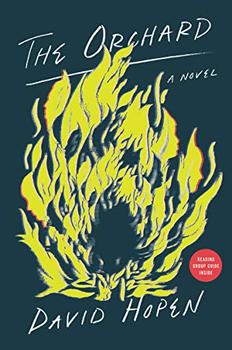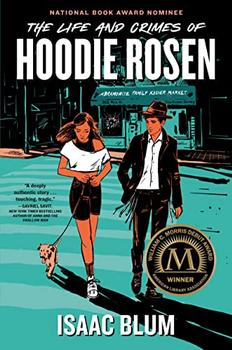Summary | Excerpt | Reading Guide | Reviews | Beyond the book | Read-Alikes | Genres & Themes | Author Bio

A commanding debut and a poignant coming-of-age story about a devout Jewish high school student whose plunge into the secularized world threatens everything he knows of himself.
Ari Eden's life has always been governed by strict rules. In ultra-Orthodox Brooklyn, his days are dedicated to intense study and religious rituals, and adolescence feels profoundly lonely. So when his family announces that they are moving to a glitzy Miami suburb, Ari seizes his unexpected chance for reinvention.
Enrolling in an opulent Jewish academy, Ari is stunned by his peers' dizzying wealth, ambition, and shameless pursuit of life's pleasures. When the academy's golden boy, Noah, takes Ari under his wing, Ari finds himself entangled in the school's most exclusive and wayward group. These friends are magnetic and defiant—especially Evan, the brooding genius of the bunch, still living in the shadow of his mother's death.
Influenced by their charismatic rabbi, the group begins testing their religion in unconventional ways. Soon Ari and his friends are pushing moral boundaries and careening toward a perilous future—one in which the traditions of their faith are repurposed to mysterious, tragic ends.
Mesmerizing and playful, heartrending and darkly romantic, The Orchard probes the conflicting forces that determine who we become: the heady relationships of youth, the allure of greatness, the doctrines we inherit, and our concealed desires.
The quest for knowledge leads to the plot's crisis, not teenage hijinks as one might expect in a typical book of this genre. This aspect transforms the novel from simply a well-written but forgettable tale into one that settles in the mind and heart, requiring rumination long after turning the last page. As remarkable and thought-provoking as The Orchard is, there are still aspects of it I found challenging. The meat of the book occurs so late — past the halfway point in a relatively long novel — that I was getting bored by all the teenage angst (been there, done that, no desire to relive it) and almost abandoned it. Fortunately, the second half of the narrative is worth the effort — in spades. The book will most likely appeal to readers who enjoy novels with depth, those they have to think about for a time after they've finished them — it compares well to Donna Tartt's debut, The Secret History...continued
Full Review
(733 words)
This review is available to non-members for a limited time. For full access,
become a member today.
(Reviewed by Kim Kovacs).
 In David Hopen's novel, The Orchard, the main action is set in motion by a discussion of the Jewish legend of Pardes. In the tale, four celebrated sages enter the orchard, but only one emerges unscathed by his encounter with the divine.
In David Hopen's novel, The Orchard, the main action is set in motion by a discussion of the Jewish legend of Pardes. In the tale, four celebrated sages enter the orchard, but only one emerges unscathed by his encounter with the divine.
The word "Pardes" comes from the ancient Persian word pairidaeza, which refers to an enclosed garden. The Pardes legend can be found in the Tosefta, an anthology of laws attributed to Jewish sages gathered between 0 and 200 CE, and the Talmud, the central book of rabbinic law, the first component of which — the Mishnah — was published around 200 CE. The legend is traditionally interpreted as a warning against the study of mysticism, and is meant to contrast the actions of three historic ...
This "beyond the book" feature is available to non-members for a limited time. Join today for full access.

If you liked The Orchard, try these:

by Alan Hollinghurst
Published 2024
From the internationally acclaimed winner of the Booker Prize, a piercing novel of modern England through the lens of one man's acutely observed experiences.

The Life and Crimes of Hoodie Rosen
by Isaac Blum
Published 2023
The Chosen meets Adam Silvera in this irreverent and timely story of worlds colliding in friendship, betrayal, and hatred.
Courage - a perfect sensibility of the measure of danger, and a mental willingness to endure it.
Click Here to find out who said this, as well as discovering other famous literary quotes!